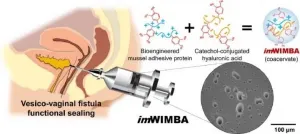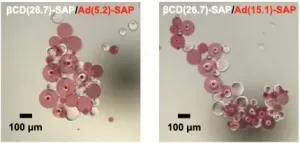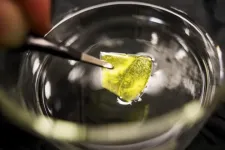(Press-News.org) The lightning speed with which scientists developed and tested the COVID-19 vaccine is a true scientific triumph -- one that would not have been possible without the more than 70,000 volunteers who participated in clinical trials of the vaccine.
Public participation is critical to the success of any medical research. Yet recruiting volunteers for trials is increasingly challenging. New research from Washington University in St. Louis suggests the widening ideological gap in the U.S. may contribute to these challenges.
Researchers found evidence that Americans approach opportunities to contribute to medical research with either a general aversion or an inclination to participate. This research concludes that propensity is driven, at least in part, by political ideology.
While much attention has been given to Black people's distrust in the medical system and research in particular, the current study -- published in Scientific Reports -- is the first to demonstrate the effect of political ideology on willingness to trust science and participate in medical research.
"Our research shows that conservatives are less willing to participate in medical research than are liberals. This difference is due, in part, to ideological differences in trust in science," said Matthew Gabel, professor of political science in Arts & Sciences.
There are potential consequences to this divide.
"An ideological divide in such participation could undermine both the execution and quality of medical research," Gabel said. "Given the uneven geographic distribution of political ideology, our findings raise important issues for recruiting study participants and developing political support for medical research. It could also threaten the generalizability of medical studies since important types of health behaviors, such as smoking, vary with Americans' political ideology."
A problem decades in the making
The problem has been brewing for decades. However, the issue did not receive significant media attention until recently, when the COVID-19 pandemic exposed the stark contrasts between liberals and conservatives. For example, a new nationwide study found Independents and Republicans were about three times more likely to express resistance to the COVID-19 vaccine than Democrats.
Long before the pandemic, though, Gabel saw the writing on the wall. He and John C. Morris, MD, the Harvey A. and Dorismae Hacker Friedman Distinguished Professor of Neurology and head of the Alzheimer's Disease Research Center at the School of Medicine; Catherine M. Roe, associate professor of neurology at the School of Medicine; and Stanford University's Jonathan Gooblar, wanted to better understand why some people were more inclined to participate in medical research than others.
"The value of research with human subjects depends critically on successful recruitment of a representative group of participants. To do that, we have to know sources of bias in who is recruited and who is likely to accept invitations to participate," Gabel said.
The researchers analyzed survey data from the July 2014 and September 2015 waves of The American Panel Survey, a survey managed by Washington University's Weidenbaum Center on the Economy, Government, and Public Policy. The survey asked questions about past and future participation in medical research-related activities: a clinical trial for a drug, a long-term observations study, a fundraiser for medical research and blood donation. It also included hypothetical questions about one's willingness to donate an organ upon death and willingness to participate in an Alzheimer's disease study. They restricted their analysis to respondents 45 years of age or older, as younger respondents would generally have been ineligible to participate in the long-term studies, clinical trials and hypothetical Alzheimer's Disease study. Altogether, the analysis included 1,132 respondents.
Lack of trust is only part of the problem
The researchers found those with conservative ideology have a systematically lower propensity to participate in medical research, due in part to their lower levels of trust in science. But lack of trust in science only accounted for about a quarter of the effect.
"This means that if we want to reduce or eliminate the ideological difference in participation in medical research, we can do some of that by trying to raise trust in science among conservatives," Gabel said. "But even if we are very effective at doing that, my analysis shows that conservatives will still be less likely to participate for ideological reasons unrelated to trust in science."
This rift is a threat to the generalizability of medical studies.
"The ideological divide in participation in medical research suggests that clinical trials and other long-term observational studies likely over-represent those with liberal political ideology. This can impact the quality of studies because significant health conditions and behaviors -- such as smoking, excessive drinking, diets and mortality rates -- differ with political ideology," Gabel said.
"Given the number and political importance of conservatives, and the relative stability of Americans' ideological commitments, this divide could signify a significant obstacle for the practice, advance and influence of science in the United States," Gabel said.
INFORMATION:
While some youth experiment with marijuana but don't go on to long-term use, others develop a problematic pot habit that continues into adulthood. A major new analysis shows that at least a small portion of the risk for developing into an adult marijuana user may be related to inherited behaviors and traits that appear during adolescence.
The journal Addiction published the findings by researchers at Brown University and Emory University.
"Our analysis suggests that some early adolescent behaviors and traits -- like depression, neuroticism and acting out -- can be indicative for cannabis use later in life," says Rohan Palmer, senior author of the paper and assistant professor in Emory's ...
Politicians and business leaders often make claims about why certain sectors in the economy are shrinking, such as the decline in U.S. manufacturing is due to robotics or trade with China. Such assessments are flawed, as the sectoral composition of the economy is mostly driven by preferences and not by productivity, according to a recent study that models this long-run structural change in the economy. As consumers become richer, they spend more on services such as health and education whose demand is much more income elastic, and less on agriculture and manufactured goods. Until now, productivity has often been considered at least as important, if not more, than preferences, in shaping the sectoral composition of the economy. The results ...
With the offshore wind industry expanding in the United States and elsewhere, a new study raises questions about how the noise from impact pile driving to install turbine supports can affect feeding behaviors of longfin squid, a commercially and ecologically important cephalopod.
The research, conducted by scientists from the Woods Hole Oceanographic Institution (WHOI) and other institutions, is believed to be the first to demonstrate that anthropogenic noise prompts changes in cephalopod feeding behaviors.
"The whole reason we are doing this study is because we are concerned about how construction from offshore wind farms and the sounds associated with that are going to affect important fisheries species, one ...
A considerably higher dose of the anti-tuberculosis drug rifampicin is safe and can also lead to a shorter treatment for tuberculosis and less resistance. This is what researchers from Radboud university medical center in Nijmegen, the Netherlands, write in a recent publication. With this they complete a year-long search for the right dosing of an old drug against tuberculosis that appears to be the key drug.
Tuberculosis is a deadly, pertinacious bacterial infectious disease that affects nine million people worldwide each year, mainly in countries in low and middle income countries. For over a million, ...
Northwestern engineering researchers have demonstrated a new approach to chemical catalysis that results in high propylene yields using less energy. The findings could support more energy-efficient production processes for many plastics.
One of the highest volume chemical products, more than $100 billion worth of propylene is produced each year and used primarily to produce polypropylene for a variety of materials, from injection moldings in car parts to consumer products. Producing propylene is also energy intensive, requiring temperatures around 800 degrees Celsius to convert propane gas to propylene.
One technique, called oxidative dehydrogenation, ...
A researcher from Skoltech has filled in the gaps connecting quantum simulators with more traditional quantum computers, discovering a new computationally universal model of quantum computation, the variational model. The paper was published as a Letter in the journal Physical Review A. The work made the Editors' Suggestion list.
A quantum simulator is built to share properties with a target quantum system we wish to understand. Early quantum simulators were "dedicated" - that means they could not be programmed, tuned or adjusted and so could mimic one or very few target systems. Modern quantum simulators enable some control over their settings, offering more possibilities.
In contrast to quantum simulators, the long-promised quantum computer is a fully programmable quantum system. While ...
A Korean research team has recently developed an innovative vesico-vaginal fistula treatment method using the mussel adhesive protein (MAP) that can effectively seal fistulas in organs even when exposed to urine.
Professor Hyung Joon Cha, Dr. Hyo Jeong Kim (currently at Korea Research Institute of Chemical Technology), and Dr. Tae Yoon Park of POSTECH's Department of Chemical Engineering with Professor Seok Ho Kang of the Department of Urology at Korea University School of Medicine and Professor Jong Hyun Pyun of the Department of Urology at Kangbuk Samsung Hospital have together improved the underwater adhesive using mussel protein and applied it to a pig model that simulated a vesico-vaginal fistula. ...
Osaka, Japan - Scientists from the Graduate School of Science at Osaka University created superabsorbent polymer (SAP) microparticles that self-assemble into structures that can be modified by adjusting the proportion of particle type. This research may lead to new tunable biomimetic "smart materials" that can sense and respond to specific chemicals.
Biological molecules in living organisms have a remarkable ability to form self-assembled structures when triggered by an external molecule. This has led scientists to try to create other "smart materials" that respond to their environment. Now, a team of researchers at Osaka University has come up with a tunable system involving poly(sodium acrylate) microparticles that can have one of two types of chemical ...
The white paper, published today (March 22) by REPHRAIN, the National Research Centre on Privacy, Harm Reduction and Adversarial Influence Online in collaboration with the Dutch National Police, offers a solution to big data problems that tend to hamper police probes into this type of law-breaking.
The practice of attribution - who did what - is becoming increasingly complex as organised crimes incorporate deception, deletion and encryption in today's Information Age. Even when law enforcement are able to retrieve evidence via digital forensics, the complexities of the collected data mean it cannot be easily processed into factual police reports. ...
One prospective source of renewable energy is hydrogen gas produced from water with the aid of sunlight. Researchers at Linköping University, Sweden, have developed a material, nanoporous cubic silicon carbide, that exhibits promising properties to capture solar energy and split water for hydrogen gas production. The study has been published in the journal ACS Nano.
"New sustainable energy systems are needed to meet global energy and environmental challenges, such as increasing carbon dioxide emissions and climate change", says Jianwu Sun, senior lecturer in the ...



